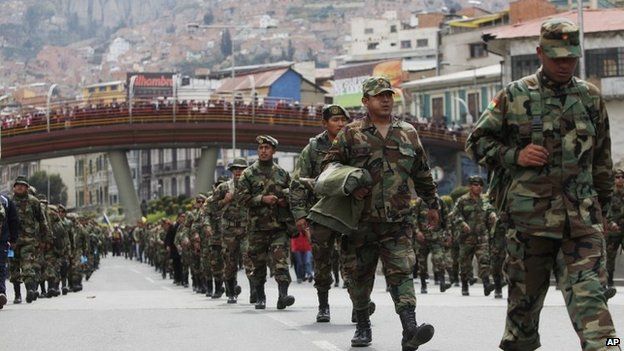Bolivia dismisses hundreds of protesting soldiers
- Published

Bolivia's military chiefs have ordered the dismissal of 702 servicemen who have been protesting to demand better working conditions.
The army, navy and air force accused the men of committing acts of sedition and rebellion, and attacking the honour of the armed forces.
The soldiers say the armed forces discriminate against indigenous Bolivians, a claim the military denies.
Protesters are calling for a meeting with President Evo Morales.
The protest began on Tuesday with 500 soldiers, but grew to about 1,000 on Thursday.
Non-commissioned officers and sergeants dressed in camouflage uniforms - some with their wives - marched through Bolivia's main city, La Paz, along with Aymara indigenous leaders who support their demands.
"Today we are victims of persecution, intimidation, and threats that target our families," a protest leader, Johnny Gil, told Reuters news agency.
Discipline
The protesters are demanding reforms so that non-commissioned officers can be promoted beyond the rank of sergeant and get access to equal training opportunities to become career officers.
They also want the end of what they see as discrimination in the areas of salaries, housing and health care.
President Morales, himself an Aymara, called for "discipline" within the forces.
"We are talking about armed forces that are ready to defend our homeland. If there is no discipline, there are no armed forces in Bolivia," he told a news conference in La Paz.
But another protest leader, Marcela Shiriqui, accused him of "only listening to military leaders".
"All we have done is to ask for equal treatment within the forces and an end to discrimination. We will continue with our protest," she told Bolivia's Erbol radio station.
The military rejected what it called an "excuse".
"Discrimination is not an excuse for sedition and to orchestrate a coup d'etat," Chief of Armed Forces Victor Baldivieso told Bolivia's state-owned Abi news agency.
On Wednesday, Defence Minister Ruben Saavedra said the country's armed forces were changing and that in 2015 enlisted soldiers and sergeants would be able to receive scholarships to study to become officers.
Bolivia's 38,000 strong armed forces have about 10,000 non-commissioned officers, according to the AFP news agency.
- Published22 April 2014
- Published11 March 2014
- Published7 February 2023